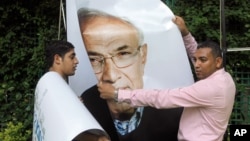CAIRO - Egypt's election officials are reviewing complaints about irregularities in the nation's first freely-contested presidential election, delaying announcement of the results. The indefinite postponement is adding to tensions already heightened by the appropriation of some presidential powers by the military.
Supporters of Muslim Brotherhood candidate Mohamed Morsi are planning another mass rally in Cairo's Tahrir Square Thursday, demanding a quick resolution of the country's political crisis.
Election officials put off the planned Thursday announcement of the results, as they went through hundreds of complaints lodged by Morsi's campaign and that of his rival, former prime minister Ahmed Shafiq.
Both sides are claiming victory and Morsi supporters are concerned the delay could be an attempt to alter the unofficial results. Initial tallies by various observers in polling stations across the country appeared to give Morsi the lead. But those results are within a margin of error.
There have been threats from supporters of both men of a backlash should their candidate be declared the loser. But a Shafiq official late Wednesday tried to defuse the tensions. Campaign spokesman Basel al-Baz told reporters in Cairo his candidate would accept the results.
"In the event that candidate Morsi is indeed successful and victorious in the election, the first telephone call he will receive will be from candidate Shafiq," said al-Baz. "Not only will he receive this phone call from him, but in fact the services of candidate Shafiq shall be offered for the good of the country moving forward, at the end of the day we are looking for unity."
The election results are only part of the political standoff. In the past week, the ruling military council has re-introduced elements of martial law, carried out the court-ordered dissolution of parliament and taken for itself legislative and some presidential powers. The moves come just weeks before the council has promised to return all power to a civilian leadership.
Veteran diplomat Abdullah al Ashaal, a candidate in the first round of the elections who threw his support to Morsi, says whoever wins will need to be very intelligent in its negotiations with the military.
“The problem of the new president is not to reform the country and bring it back to the normal," said al Ashaal. "His problem is the military council withdrawing. Even if it is withdrawing on paper, it is still holding the security and the corruption that it was. And, this is why a confrontation is in fact inevitable between the head of state and the military council.”
One more element adding to the general sense of uncertainty is the health of former president Hosni Mubarak. The ex-leader, sentenced to prison earlier this month for his role in the deaths of Tahrir Square protesters last year, was transferred to a military hospital Tuesday. Varying accounts of his condition have raised suspicions that the move was not medically necessary, but rather used to get him out of prison.
Supporters of Muslim Brotherhood candidate Mohamed Morsi are planning another mass rally in Cairo's Tahrir Square Thursday, demanding a quick resolution of the country's political crisis.
Election officials put off the planned Thursday announcement of the results, as they went through hundreds of complaints lodged by Morsi's campaign and that of his rival, former prime minister Ahmed Shafiq.
Both sides are claiming victory and Morsi supporters are concerned the delay could be an attempt to alter the unofficial results. Initial tallies by various observers in polling stations across the country appeared to give Morsi the lead. But those results are within a margin of error.
There have been threats from supporters of both men of a backlash should their candidate be declared the loser. But a Shafiq official late Wednesday tried to defuse the tensions. Campaign spokesman Basel al-Baz told reporters in Cairo his candidate would accept the results.
"In the event that candidate Morsi is indeed successful and victorious in the election, the first telephone call he will receive will be from candidate Shafiq," said al-Baz. "Not only will he receive this phone call from him, but in fact the services of candidate Shafiq shall be offered for the good of the country moving forward, at the end of the day we are looking for unity."
The election results are only part of the political standoff. In the past week, the ruling military council has re-introduced elements of martial law, carried out the court-ordered dissolution of parliament and taken for itself legislative and some presidential powers. The moves come just weeks before the council has promised to return all power to a civilian leadership.
Veteran diplomat Abdullah al Ashaal, a candidate in the first round of the elections who threw his support to Morsi, says whoever wins will need to be very intelligent in its negotiations with the military.
“The problem of the new president is not to reform the country and bring it back to the normal," said al Ashaal. "His problem is the military council withdrawing. Even if it is withdrawing on paper, it is still holding the security and the corruption that it was. And, this is why a confrontation is in fact inevitable between the head of state and the military council.”
One more element adding to the general sense of uncertainty is the health of former president Hosni Mubarak. The ex-leader, sentenced to prison earlier this month for his role in the deaths of Tahrir Square protesters last year, was transferred to a military hospital Tuesday. Varying accounts of his condition have raised suspicions that the move was not medically necessary, but rather used to get him out of prison.




